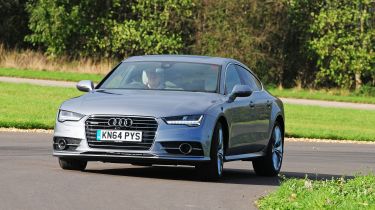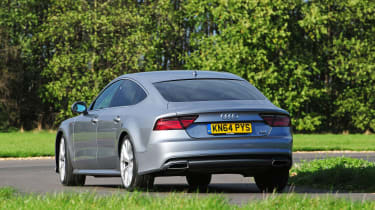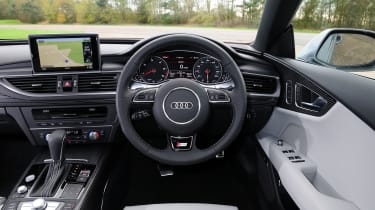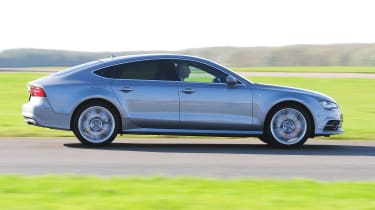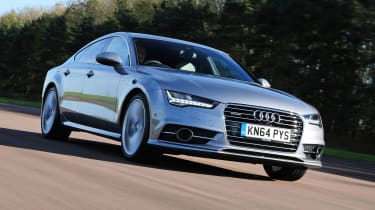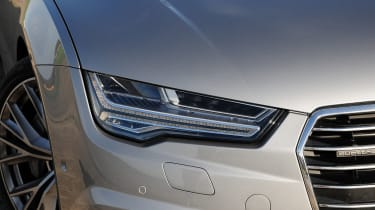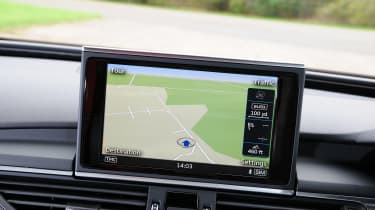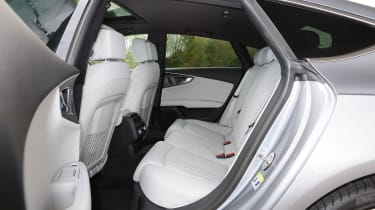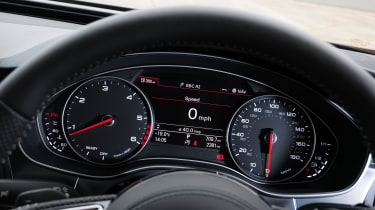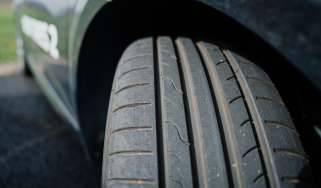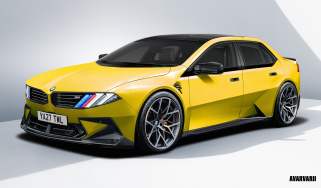Audi A7 Sportback (2010-2017) review
Sleek styling and hatchback practicality set the Audi A7 Sportback apart from the usual executive saloon car suspects

The Audi A7 Sportback was part of the recent boom in four-door coupes, which saw cars like the Mercedes CLS steal sales from conventional saloons thanks to sleeker styling but undiminished practicality. Since the A7's release, plenty more rivals have arrived, such as the BMW 6 Series Gran Coupe and Volkswagen CC - but it remains goodlooking, roomy, and competitive in the ever crowded market.
With sleeker styling than the A6 executive saloon on which it’s based, the A7 Sportback is a handsome car. There’s a lot of tech on offer too and no version is short of performance. However, the largest Sportback model in the range doesn’t have as wide a choice of engines as the smaller four-door coupe models Audi produces, such as the A5 Sportback.
There are four 3.0-litre engines to choose from, including three turbodiesels and one petrol. All are very powerful and the firm’s quattro four-wheel drive system is standard with all except one model, so the A7 has plenty of grip in slippery conditions. If it’s efficiency you’re after, the solitary front-wheel drive model is the 3.0-litre TDI Ultra, which has the best economy and emissions in the range and is also the cheapest A7 to buy. The high performance S7 and RS7 models are reviewed separately.
More reviews
Car group tests
In-depth reviews
Long-term tests
Road tests
Used car tests
Despite its sloping roofline, the Audi A7 Sportback is very practical and there’s a lot of room inside. If you choose wisely, the list of standard equipment is respectable, too: the trim line-up is limited to SE Executive, S line and Black Edition models. Even the £46,415 SE Executive model gets a good amount of standard equipment, including 19-inch alloy wheels, Audi’s Drive Select system, LED headlights, sat-nav, Bluetooth, a DAB radio, cruise and four-zone climate control, keyless go and front and rear parking sensors.
S line adds larger 20-inch alloy wheels, sports suspension and seats, Matrix LED headlights and an S line body kit. The top of the range Black Edition gets 21-inch alloys, an even lower ride height, Audi’s black styling pack and a BOSE hi-fi.
Although it costs quite a lot of money, the A7 undercuts the Mercedes CLS by around £500 – and for your money you only get a 2.1-litre 175bhp four-cylinder turbodiesel engine in the Merc, so the Audi is a lot more powerful.
The Audi A7 Sportback is a large, four-door coupe based on the A6 executive saloon. It’s more expensive than the A6 and does away with smaller engines in favour of larger 3.0-litre units, so it’s more powerful and more expensive.
But four doors, lots of legroom and a large boot make it very practical for a coupe, so buyers can have the svelte looks without sacrificing much in the way of space.
Every version is fast and powerful – even the entry-level Ultra model will hit 62mph in 7.3 seconds but still returns an official 58.9mpg. Flagship S7 and RS7 versions take things to another level on the performance front.
Engines, performance and drive
Audi’s quattro four-wheel drive system is fitted across the range – except if you go for the entry-level Ultra model, which sacrifices it for greater efficiency. All A7s also come with Audi’s seven-speed S tronic dual-clutch automatic gearbox as standard, although the BiTDI diesel model uses an eight-speed automatic instead.
While these all-wheel drive quattro versions promise strong grip in slippery conditions, the A7 isn't as much fun to drive as the Mercedes CLS, which is rear-wheel drive. However, there’s ample power on offer in every version of the A7 and refinement is incredible.
The A7 Sportback is a fine cruiser, with precise steering and a quiet cabin thanks to an acoustic windscreen that takes the edge off road noise along with refined engines. However, the standard versions are not the most engaging cars to drive, so if fun is more important than comfort, we'd recommend the S line or Black Edition models, which have lower, firmer suspension and bigger wheels – though the trade-off is a harder ride.
Audi Drive Select is featured across all models, allowing the driver to fine-tune the suspension, steering and accelerator response to their preference.
Engines
Engine choice is limited to powerful 3.0-litre V6 engines, with both petrol and diesel models available. The 3.0 TFSI (the only petrol version in the standard A7 range) produces a healthy 328bhp and is rapid enough for 0-62mph in 5.3 seconds.
The entry-level 3.0-litre TDI Ultra offers 215bhp and takes 7.3 seconds to reach 62mph. There’s also a 268bhp version, which is good for 0-62mph in 5.7 seconds.
At the top of the range sit Audi’s 444bhp S7 and incredibly rapid 552bhp 4.0-litre twin-turbo V8 RS7 models, but the performance king of the regular line-up is actually the beefy 317bhp 3.0-litre BiTDI twin-turbo V6 diesel. It’s is not as economical as the regular TDI, but it’ll cover 0-62mph in 5.2 seconds – 0.1 seconds faster than the TFSI petrol – and has a monstrous amount of mid-range power.
MPG, CO2 and Running Costs
Audi has decided not to offer the efficient 2.0-litre TDI diesel engine with the A7 Sportback, which means the next best thing is the front-wheel drive 215bhp 3.0-litre TDI Ultra model. It emits 124g/km of CO2 and returns a claimed 58.9mpg.
The same 215bhp 3.0-litre TDI engine with the firm’s quattro four-wheel drive system returns 54.3mpg and 138g/km. Those figures are identical for the 268bhp version.
The least economical diesel engine is the 317bhp 3.0-litre BiTDI model with 167g/km (£205 tax per year) and 44.8mpg, while the solitary 3.0-litre TFSI petrol engine returns 36.2mpg and 182g/km. High performance S7 and RS7 models have even higher running costs but that’s less likely to be a concern for buyers in that market.
Every A7 is fitted with Audi’s automatic stop-start system with energy recovery, which means the engine cuts out when the car comes to a stop for a short period of time. The recovery system converts energy from braking into electrical power that’s sent to the battery and put to use elsewhere.
Insurance groups
Insurance groups start at 33 for the entry-level 215hp 3.0-litre TDI Ultra version. The same model with the quattro four-wheel drive system is in group 40, as is the 268bhp variant and the 317bhp 3.0-litre BiTDI A7. The 3.0-litre TFSI petrol model is either in group 40 or 41.
The Audi is pretty much on par with the BMW 5 Series GT and the Mercedes CLS in this respect, both of which have insurance groups starting in the 30s and rise into the 40s.
Depreciation
Audis traditionally have excellent residual values and there’s no reason to think the A7 will be any different. We expect used prices to be reasonably strong, with most examples retaining just under 50 per cent of their new price after three years and 36,000 miles.
Interior, design and technology
The A7 is a big car with a low-slung body and a muscular front end. At the front you get Audi's trademark large grille and LED headlights, while at the back there’s retractable spoiler (borrowed from the TT coupe) at the end of the sloping roofline, which gives the A7 a sleek and sporty appearance.
The A7 received a mid-life refresh in 2014, too. The five-door coupe has always been stylish and it’s undoubtedly one of the best looking models in the brand’s line-up. Even so, the designers have still managed to improve the car’s styling.
The revised A7 has a more defined grille, while the bumpers have been re-designed for a more aggressive appearance. The LED indicators at the front and rear now have a neat ‘scrolling’ function, so they flash in the direction in which you’re turning.
Audi’s dynamic Matrix LED headlights not only improve visibility but they also have 24 individual bulbs that automatically dim when their sensors detect oncoming traffic so as not to dazzle other drivers.
As with the exterior, the interior changes for the facelifted model have been kept low key. The layout hasn’t changed and still has the feel of wraparound luxury. The slick dashboard design is one of the best in the business and, as you’d expect, everything is extremely well built and there are lots of options on offer to improve the spec and customise the car.
The sporty S line and Black Edition models come with racy side sill extensions and lowered suspension – 10mm and 20mm lower than the standard car respectively, although S line buyers can choose to have normal (i.e. softer) suspension at no extra cost.
It’s worth considering if you prefer your car to be comfortable, as the sportier suspension makes for a firmer ride on rough, potholed roads. There's also hi-tech optional kit such as the £1,350 Comfort pack, which includes a reversing camera, and Audi’s Technology pack advanced that adds adaptive cruise and lane assist.
Sat-nav, stereo and infotainment
The A7's dashboard is similar to the latest A6's – it’s extremely well built with simple controls and the latest version of Audi's MMI (Multi-Media Interface) infotainment system, which is very easy to use.
USB and iPod compatibility, DAB radio and Bluetooth are standard, while an advanced Google Earth HD sat-nav system is an option.
Practicality, comfort and boot space
The big practicality drawback over the A6 saloon on which the A7 Sportback is based is that it’s a four rather than a five-seater, as there’s no central rear seatbelt. However, if you’re prepared to accommodate one fewer passenger then the A7 is actually a very spacious car, particularly for those in the rear seats.
There’s a lot of storage in the front of the cabin, including a large glovebox and three separate storage bins across the centre console (one in front of the gear stick, one in the middle of the centre console and one beneath the armrest).
One drawback of that roofline is that the driver's all-round visibility isn't great, so it's worth paying extra for the optional rear-view camera.
Size
The A7 is 4,974mm long, 1,911mm wide and 1,420mm tall. It’s a big car and larger than its chief rival, the Mercedes CLS, in every respect – though it’s shorter than the BMW 5 Series GT.
Leg room, head room & passenger space
Rear legroom in the A7 is extremely generous and there's even enough room for adults – at least those under six feet tall – to sit in relative comfort in the back and stretch out their legs. There’s a decent amount of headroom as well thanks to the low seating position.
The only downside is that the angle of the roof intrudes a little, so taller passengers may be slightly cramped – but as coupes go, it’s still very roomy.
Boot
The Audi A7 has a hatchback-style boot that provides good access to a 535-litre load bay. This turns into a 1,390-litre space with the rear seats folded flat, meaning there's plenty of room for luggage. While the boot is a little shallow, it makes up for that by being long and wide.
The powerful 3.0-litre petrol and diesel engines mean the A7 can tow 2,100kgs behind it, whichever engine it has.
Reliability and Safety
The A7 Sportback is based on the same chassis as the Audi A6 saloon’s, so there shouldn’t be any major problems with reliability. Though the A7 didn’t appear in our 2015 Driver Power owner satisfaction survey, the A6 came a respectable 54th out of 200 cars, leaving it just outside the top quarter. It scored extremely well for build quality, finishing fifth overall.
Audi itself finished 13th out of 32 in the manufacturer survey – a middling result and one down from last year. However, Audi didn’t score favourably in the dealer survey, with a disappointing finish of 26th out of 32.
The A7 hasn’t been crash-tested by Euro NCAP but the A6 achieved five stars and has an impressive 91 per cent score for adult occupant protection. We’d expect a similar performance from the A7, which has six airbags, stability control and LED headlamps as standard.
It’s also available with a host of extras, such as night vision cameras, a head-up display, side assist and adaptive cruise control with low-speed stop and go function. Be careful when adding these extras, though, because the Audi’s price can soon skyrocket.
Warranty
Though it offers the same three years as most of its rivals, Audi’s warranty lags behind fellow premium manufacturers in terms of mileage. It’s capped at 60,000 miles, whereas the likes of BMW, Jaguar, Mercedes and Porsche all have three-year/unlimited-mileage warranties.
Servicing
Service intervals are variable for the A7 so the regularity of maintenance will depend on your mileage and how you drive the car. The firm does have a series of fixed and flexible service schedule programmes but these are dependent on usage and are worked out at the dealer.
Audi offers fixed price servicing for privately owned cars over three years old and an interim service for the A7 costs £199, while a major service is £399.
Which Is Best
Cheapest
- Name40 TDI Quattro Sport 5dr S Tronic
- Gearbox typeSemi-auto
- RRP£57,610
Most Economical
- Name40 TDI Quattro Sport 5dr S Tronic
- Gearbox typeSemi-auto
- RRP£57,610
Fastest
- NameS7 TDI Quattro Black Edition 5dr Tronic Auto
- Gearbox typeSemi-auto
- RRP£79,840

